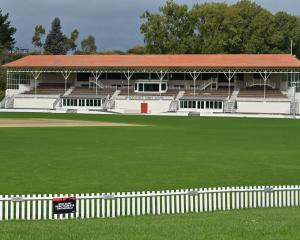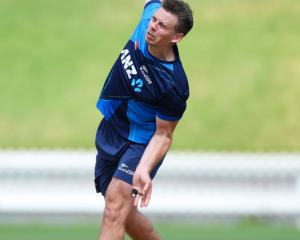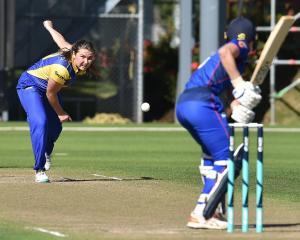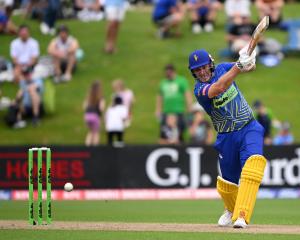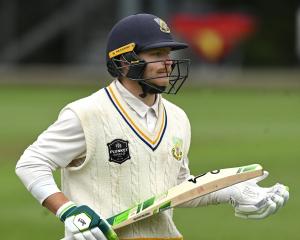
One door in the dining room bears the name Bradman, inevitably, the other Compton.
Fame, eh?
Denis Compton was among the great English post-World War II batsmen.
When his grandson Nick arrived in New Zealand he had a job to do to secure his place opening the batting, with at least half an eye on the forthcoming Ashes series in England.
He'd played all four tests in India late last year, with steady returns and an average of 34. When he was out to an indifferent defensive stroke for 0, fourth ball in the first innings of the opening test in Dunedin, he could have been forgiven for jangling nerves over how long his test tenure would last.
Young Joe Root is tipped as the fast riser in English batting circles and is a proficient opener. Important eyes were watching.
But Compton's response was as decisive as you could wish for.
His opening stand in the second innings with captain Alastair Cook produced 231 and Compton, to the teary-eyed delight of father Richard looking on, made 117.
He followed that with a brisker, more confident and authoritative 100 in the first innings at the Basin Reserve last week, sharing a 210 second-wicket stand with Jonathan Trott. Roll on the Ashes.
When England began the ANZ international series tests, plenty was known about Cook, Trott, Kevin Pietersen and Ian Bell. Root was the fresh-faced newcomer, but what of Compton?
He came within one wet day of becoming just the ninth player to reach 1000 first-class runs before the end of May in the last English season. No one's done it since Graeme Hick 25 years ago.
Durban-born Compton is a late bloomer in the England team. For six years to 2009 at Middlesex, his grandfather's county, he averaged about 34.
He switched to Somerset in 2010 and the runs have flowed, averaging 56 and 99 in the last two summers.
He's not a flash-and-dash opener, more about occupation of the crease, and valuing his wicket.
Former England opener Geoff Boycott knows a thing or two about the role, and likes what he has seen.
"He's always going to be an old-fashioned opening batsman who takes his time, sees off the new ball, tries to tire the opening bowlers and give the innings a platform. That's no bad thing for England."
Cook, with whom Compton has shared 11 opening stands averaging an impressive 75, speaks highly of his partner and how he goes about things in the middle.
"He's very clear on what he wants to do and is actually very good at picking out little things that I'm trying to do," Cook said.
"He's quite intense, but that's good for him because it works so well. You know he is focused 100 per cent and that's all you can do."
Ten Ashes tests within seven months are ahead for England but Compton, averaging 47, is wary of taking anything for granted and speaks pragmatically of what is ahead of him.
"I have played enough cricket now to know that the line between success and failure is quite thin and I think the more you play, the more respect you have for the game, the more humility you have to have in some ways, because things can change very quickly, they can go wrong," Compton said.
"You go to bed at night thinking about the Ashes, you might read the odd comment here and there of course. You get full of exuberance, which is what keeps driving you. I would be lying if I said I didn't want to play in an Ashes series, of course I do.
"But having played enough, looking too far ahead doesn't do any good. You have to make sure that you stick to the next game. After this series I go back to county cricket, I get my head down again and make sure if that time arrives, I put myself in the box seat."
When the Ashes start at Trent Bridge in July, it will be 60 years since Denis Compton hit the winning runs in the final Ashes test at the Oval, England regaining the little urn for the first time since the Bodyline series of 1932-33.
The man of the series award is the Compton-Miller medal, the Australian half named for the charismatic allrounder Keith Miller. What chance of a fairytale?
"It would be nice to win that medal, wouldn't it? But I'm under no illusions.There's a lot of cricket before then."
- By David Leggat of the NZ Herald


